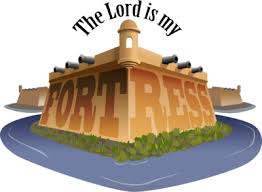Introduction: The scriptures record many, many instances when God gave Israel victory in battle over her enemies. But this particular psalm is somewhat unusual – it does not celebrate an offensive victory in battle. Instead, it gives glory and honor to God for his successful defense against an enemy.
What was the exact historical circumstance the author was celebrating with this song? Many answers have been given, including the defeat of the Assyrians (led by Sennacherib) and the miraculous destruction of their army. If you haven't read this account recently, you really should review it. You can find it in II Kings 19 and Isaiah chapters 36 and 37.
In that particular incident, which happened during the reign of King Hezekiah, Israel did not fight at all. She was under siege by the Assyrian army, and she simply waited for God to rescue her. It is an amazing testimony to the power of God!
II Kings 19:34 – For I [God] will defend this city to save it, for my own sake and for the sake of my servant David.
Other people believe this Psalm speaks of a time that is future – the day when Christ returns to earth and rescues Israel from those who are yet to surround her, and then sets up his millennial kingdom.
While these two examples could certainly be the basis for this Psalm, we really don't know what circumstance prompted the writer to pen this song of praise and glory to God. But in some ways, I am glad we don't know.
The truth is that in every generation there are people of God who need to be rescued from their adversaries. And in every generation, God answers that call. Therefore, this is a timeless Psalm that applies to Christians of every age, including us.
Psalms 46:1 – To the choirmaster. Of the Sons of Korah. According to Alamoth. A Song. God is our refuge and strength, a very present help in trouble.
Surely the children of Israel had good cause to declare that God was their refuge. Time and time again they fled to the protection of the Father and he saved them. Just consider a few examples:
- Pharaoh and his army thought they had trapped the Israelites at the Red Sea, but God prepared a dry path through the water (Exodus 14:21-22).
- The Midianites ravaged the land of Israel, stealing all her crops, but God used Gideon and 300 other men to destroy that innumerable army (Judges 6 and 7).
- Haman planned to exterminate the Jews, but God rescued them through Queen Esther.
The examples go on and on - which ones come to your mind?
God is also a safe refuge for the church. Many times in the New Testament, we find great persecution breaking out as Satan attempts to destroy the fledgling church (Acts 8:1). But God not only protects and preserves the church, he causes it to flourish even in the midst of evil.
 As believers, each of us can trust in God as our refuge (Psalms 9:9). I know you have done so many times in your life, because I have too. What were some of the circumstances when God was a refuge for you?
As believers, each of us can trust in God as our refuge (Psalms 9:9). I know you have done so many times in your life, because I have too. What were some of the circumstances when God was a refuge for you?
The Israelites were also living proof of God's strength. From the Egyptians to the Amorites to the Nazis, many groups have endeavored to completely destroy this nation. Yet none have been successful, because God is their strength! When they were weak, he was strong. When they should have been wiped out, he intervened.
The church of Jesus Christ can make the same claim. From its inception during Roman rule, throughout the crusades and in the midst of modern-day persecution, Satan seeks to destroy her time and time again. But the church is still here. Even now, in the last dispensation of time, God is strengthening the church. He is pouring out his Spirit upon us, to make us victorious over the enemy.
The psalmist adds that God is a very present help in times of trouble.
I am sure that King Hezekiah would agree, as he sat in Jerusalem while it was besieged by the Assyrians. God assured him through the prophet Isaiah that victory would come, and it did. God sent an angel of destruction who killed 185,000 Assyrians in one night, and the next morning what remained of the enemy withdrew from Jerusalem.
I am sure that America would agree, as they fought for independence from Britain. The settlers desired a country where they could freely worship God. God granted that request and so much more!
I am sure that you would agree too. When has God been a very present help to you?
Psalms 46:2-3 – Therefore we will not fear though the earth gives way, though the mountains be moved into the heart of the sea, though its waters roar and foam, though the mountains tremble at its swelling. Selah.
Have you noticed that over and over in the scriptures, God gives us the mandate 'Fear Not'? We should be using this as a motto!
- God assures us that no weapon formed against us shall prosper (Isaiah 54:17).
- He assures us that if he is for us, no one can be against us (Romans 8:31).
- Long ago he let us know that he is greater and more powerful than he that is in the world (I John 4:4).
- Our own experience should give us a personal confirmation that we should not be living in fear.
In fact, it is our great privilege and duty to be living in boldness without fear. The psalmist recognized that fact and thus he penned the declaration 'though the earth gives way' and/or 'the mountains be moved into the sea', those who trust in God have no reason to fear.
Let's discuss the 'earth gives way'. Certainly, this could be taken literally to mean that the entire earth would fall from the heavens. But if that happened, fear would only be a factor for a matter of moments before all life would cease (either burned up or frozen, depending on which direction the planet would go).
Alternatively, some catastrophic event could occur that literally causes the mountains to crash down into the sea. But again, if that happened, the result would be a quick death for every living thing on the planet.
Is there another interpretation? We must keep in mind that the psalms are poetic in nature. Poetry frequently assigns human characteristics to inanimate objects. Could that be what is happening here?
Did you know that the scriptures often use the sea as a metaphor for the nations of the world (Daniel 7:1-6), and mountains as individual kingdoms (Amos 6:1)? The overall picture given here in poetic form is a situation in which the nations of the world are in turmoil. No nation has an answer for the problems its people face. Governments are constantly being overturned by rebellions or coups. Each nation fears hostility from other nations, and worries what will happen to them if uncontrolled conflict erupts. There is no 'world leader' to maintain peace and order.
I don't know about you, but that type of situation would invite fear into my life!
 But as the people of God, we don't have to open the door to the spirit of fear when it comes knocking. Christians stand upon the solid, unchanging rock Christ Jesus. Our treasures are in heaven, where they cannot be destroyed; our life with God continues when this life is over. We have been assured that Jesus is returning for his bride, and our future rests in him.
But as the people of God, we don't have to open the door to the spirit of fear when it comes knocking. Christians stand upon the solid, unchanging rock Christ Jesus. Our treasures are in heaven, where they cannot be destroyed; our life with God continues when this life is over. We have been assured that Jesus is returning for his bride, and our future rests in him.
In fact, if the earth suddenly evaporates, the person who has cause to fear is the unbeliever, who has laid up all their treasures on earth. They will lose what they had in this life, and they have no life in eternity.
Do you see any parallels to this passage and the situation of the world governments today? If so, does a spirit of fear try to rise up and take control of your life? Don't allow yourself to get hit with that fiery dart of the enemy! Get out your shield of faith and repel it. Utilize your sword of the Spirit (the word of God) and chase fear away!
Psalms 46:4-5 – There is a river whose streams make glad the city of God, the holy habitation of the Most High. God is in the midst of her; she shall not be moved; God will help her when morning dawns.
In opposition to the chaotic, fearful turmoil of the sea (world), God offers his people a river that flows from his habitation. It is a river of peace and calmness. It is a river of joy and blessing. It is a river protection and healing. It is a river of wisdom and strength. It is a life-giving river.
Physically speaking, the psalmist probably refers to the waters of Siloam, which travel softly by Jerusalem (Isaiah 8:6-7). This river was a defense to the people of God during the reign of Hezekiah (Isaiah 22:10-11).
But spiritually speaking, there is a river of God that flows from his habitation or throne in heaven (Revelation 22:1-2). The Tree of Life, whose leaves heal the nations, is on either side of it. This is the same water that Jesus refers to in John 7:38-39, when he says out of our hearts (belly or literally womb) would flow rivers of living water. This river of water refers to the Holy Spirit.
 The river or presence of the Holy Spirit brings the people of God peace, calmness, joy, blessing, guidance, wisdom, protection and healing. The Spirit of God gives us life.
The river or presence of the Holy Spirit brings the people of God peace, calmness, joy, blessing, guidance, wisdom, protection and healing. The Spirit of God gives us life.
How would you classify your relationship to Holy Spirit? Is it a close intimate one, or are you just acquaintances? You can change your relationship with the Spirit in the same way you change physical relationships. You get to know him better by spending time with him (prayer) by learning who he is and what his plans are (reading the word), and by engaging with him during your everyday life.
Holy Spirit has gifts for you personally and gifts from God that he wants to manifest through you to a lost and dying world. Are you open to that kind of a relationship with him?
Psalms 46:6-7 – The nations rage, the kingdoms totter; he utters his voice, the earth melts. The Lord of Hosts is with us; the God of Jacob is our fortress. Selah.
God is sovereign over all the nations of this world. He rules from heaven by his power and providence, overruling all the affairs of men to bring about his own plans and glory.
He stops or holds in check the rage and power of the nations that oppose him and his interests in the world. No one can stop him.
Not that men haven't tried - there were many people and nations who opposed Israel and opposed David as king, but God overruled them. He spoke (uttered) his plans and purposes into existence; at his command, Israel was made a nation and David was made king.
Even now, there are many people and nations that oppose God's people – Israel, America and the church. But we have a sure hope in God. He cannot be moved. If we allow ourselves to flow in the river of Holy Spirit and learn to obey him, we will be able to say "The Lord of Hosts is with us; the God of Jacob is our fortress!"
Through God, our nation can be saved and re-established in righteousness, leaving us a nation and a heritage that we can pass on to our descendants.
Psalms 46:8-9 – Come, behold the works of the Lord, how he has brought desolations on the earth. He makes wars cease to the end of the earth; he breaks the bow and shatters the spear; he burns the chariots with fire.
The scriptures record many instances of God bringing desolation or destruction upon kingdoms, cities and nations of the world.
Again, the writer may have had the Assyrian siege of Jerusalem in mind when he penned this poem. But there are other instances as well. God caused a very great destruction to come upon the cities of the Philistines when they took the Ark of the Covenant (I Samuel 5:9), he utterly destroyed Sodom and Gomorrah (Genesis 19:24-25), and he has promised to destroy the lands of God and Magog (Ezekiel 38-39). What other examples can you think of?
Obviously, no weapon of man can fight against the Lord; human military assets (bows, chariots, tanks, missiles, nuclear warheads) are useless against God.
 What point is the writer trying to make? He is inviting the reader to contemplate known instances in which God has not just given victory to his people, but utterly and completely annihilated the enemy.
What point is the writer trying to make? He is inviting the reader to contemplate known instances in which God has not just given victory to his people, but utterly and completely annihilated the enemy.
By examining the evidence, the reader's faith is increased because he or she is reminded how completely and totally God delivers his people and brings an end to war. This is abundant proof that God is able to protect his people in times of danger.
What modern day instances could be studied for this purpose? How about the six-day war of 1967, in which Israel conquered her enemies?
Psalms 46:10-11 – Be still and know that I am God. I will be exalted among the nations, I will be exalted in the earth! The Lord of Hosts is with us; the God of Jacob is our fortress. Selah.
After considering the great victories that God has wrought on behalf of his people, it should be much easier for us to be still and trust in him.
God has done, is doing and will continue to do great and mighty things. In the midst of turmoil let us be reminded that God is working on our behalf, even when we don't see it! He will bring about victory, even when the situation looks impossible to us! His arm is never short that it cannot save!
Let us remind ourselves about God's faithfulness. He is faithful in every generation, even when we are not. For that reason, we can live confidently knowing that he will bring about the perfect resolution to every situation we face in his perfect time. There is no cause to worry or fret. As we abide in him, we can be still and see him be glorified on the earth.
Hebrews 13:6 – So that we may boldly say, The Lord is my helper, and I will not fear what man shall do to me.
The mighty acts of God are also a witness to the unbelievers of the world. At some point they too must be still in his presence. Though they hate God, they will be forced to acknowledge that he is Lord, by bowing before him (Romans 14:11).
Believers of every generation can triumph and rejoice in the fact that we have God's presence with us; the God of ALL power, authority and dominion is our Father! God has bound us to himself through a covenant of blood through his only Son.
Let me give you some encouragement, relief and strength:
The God of Jacob is our fortress!

